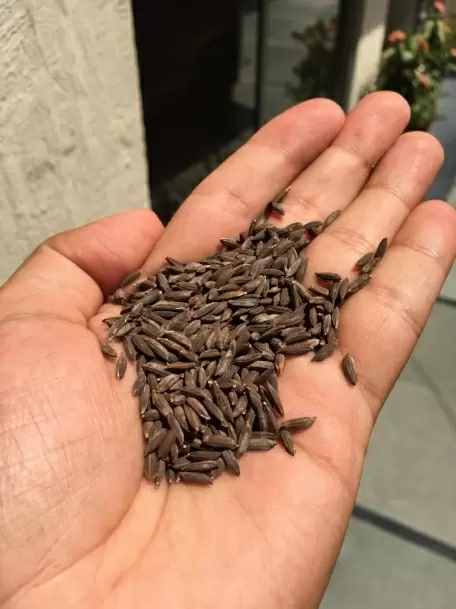Black rice production in Assam now
New Delhi
28-November-2021

PHOTO: IANS
Black rice is well suited for Assam soils and weather conditions, carrying a huge opportunity for its commercial production. The World Bank-funded Assam Agribusiness and Rural Transformation project (APART), has begun production of new black rice varieties from different states of India.
Amongst the many varieties available, black rice has seen increasing market demand in different parts of the country due to its high nutritional value. India being a predominantly rice producing nation, has a plethora of varieties, each having different nutritional properties, characteristics, and climatic preferences.
"In this Sali season (rice grown in winters), IRRI - under APART - provided 60 kg of Manipuri black rice, 30 kg of Kalamalifula and 22 kg of Kalavati amongst a few selected farmers of Goalpara district in Assam. The Manipuri black rice variety is introduced from Manipur whereas other two black rice varieties namely Kalamalifula and Kalavati were introduced from Odisha," the release said.
The seeds of these varieties were sown on a total area of 17.6 bighas of land, comprising Manipuri black rice in 10 bigha, Kalavati in 3.6 bigha and Kalamalifula in 4.0 bigha as demonstration plots.
These demonstrations are aimed to link the farmers with the buyers for higher returns and to make available good quality seed for future use. "With the current demand for black rice due to its high nutritional value and health benefits, IRRI under APART aims at increasing areas with black rice production in the coming days," the release said.
"IRRI has also introduced the crop cafeteria of the premium quality rice (PQR) varieties along with the indigenous rice varieties for comparative analysis, evaluation and selection. The purpose of the crop cafeteria is to provide an opportunity to the farmers and extension functionaries to select the best performing varieties of their preference for further adoption on their fields," said Dr Kanwar Singh, resident coordinator & Senior Associate Scientist II at the IRRI.-IANS
Watch This TWL Video
More Headlines
AI Cybersecurity Startup Neural Defend Raises $600K in Pre-Seed Round
Chennai Doctor and Family Found Dead Amid ₹5 Crore Business Loss
Karnataka Withdraws CID Probe in Ranya Rao Gold Smuggling Case
New Kerala Guv Strikes Cordial Tone, Hosts CM Vijayan And FM Sitharaman In Delhi
Digital Payments Surge in India: 18,120 Crore Transactions in FY24-25
AI Cybersecurity Startup Neural Defend Raises $600K in Pre-Seed Round
Chennai Doctor and Family Found Dead Amid ₹5 Crore Business Loss
Karnataka Withdraws CID Probe in Ranya Rao Gold Smuggling Case
New Kerala Guv Strikes Cordial Tone, Hosts CM Vijayan And FM Sitharaman In Delhi
Digital Payments Surge in India: 18,120 Crore Transactions in FY24-25










